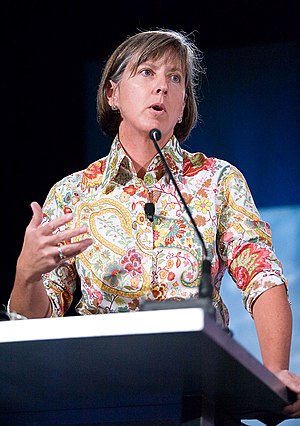
- Image via Wikipedia
Mary Meeker presented her 6th annual presentation from Morgan Stanley covering economic and Internet trends. Since 2004, the titles of her talks have been:
- 2004 – China Internet
- 2005 – Broadband
- 2006 – Online Video
- 2007 – Social Networks
- 2008 – Economic Recession
So, for 2009, the title would signal a great deal, and she didn’t disappoint, putting it simply as, “Mobile Internet.”
The slide deck is available via Scribd, and it’s another tour de force of trenchant economic analysis and penetrating customer trend analysis. Apple is identified as a standout in the Mobile space, it’s ramp of adoption for the iPhone and iTouch being much steeper than anything else in tech history, creating an ecosystem tied in with iTunes that is creating high switching costs along with rapid adoption.
In addition, Meeker notes that while the desktop Internet was largely paid for by advertising and other sources of support, the mobile Internet is so far largely paid for by individuals, a significiant shift in payment sources.
However, all this mobile bandwidth access is putting pressures on providers, who have to find ways to make it pay while matching the incredibly fast and intense adoption of these devices. For instance, since 2006, AT&T‘s mobile data traffic has grown by 4,932%, an amazing stress on any system (so you AT&T-haters, you might want to cut them some slack).
Meeker also points to Japan as a basis for learning, since the 3G penetration rate there is already over 90% compared with a rate more around 40% for the US and Western Europe. She notes that in 2000, Japan’s mobile Internet revenue mix looked a lot like the rest of the world’s does now, but had changed significantly by 2008.
She also notes that social networking has gone mobile in Japan, with Mixi‘s traffic flipping from 86% desktop in 2006 to 65% mobile in 2009, mostly due to the emergence of mobile bandwidth.
Speaking of social networking, Facebook is also called out as a major force for change, and this is where I was very sorry I wasn’t at the Web 2.0 Summit this year to hear her in-person. But her basic message about Facebook seems to be:
- Facebook has quickly assumed a leading position in its share of global time spent online (6 billion minutes are spent on Facebook each day).
- Its integrated platform (messages, chat, posts, updates, sharing of video/photos/stories, games, and VoIP calls) is a perfect complement to the emerging mobile Internet.
- Apple and Facebook together create an interesting innovation intersection, with Facebook bringing 390 million users, 350,000 applications, and 500 million downloads, and Apple bringing 85,000 applications and 2 billion downloads. Whether the two will dance more closely remains to be seen.
Overall, it’s another presentation that cements ideas to reality, with real measures and data backing up the prognostications. And the economic data, while not covered here, is excellent to absorb and is surrounded by sound interpretation.
Welcome to 2010, the year of mobile and social!
Discussion
4 Thoughts on "Morgan Stanley’s 2009 Trends Favor the Mobile and the Social"
![Reblog this post [with Zemanta]](http://img.zemanta.com/reblog_e.png?x-id=9700abbf-b0a2-4231-8057-e571b90bdff2)


